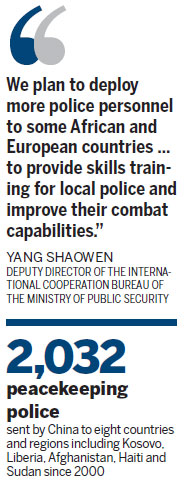More support and training offered to countries in Africa, Europe
China, the largest contributor of personnel to United Nations peacekeeping, will provide more expertise and training to fight cross-border crime on top of its traditional role of maintaining order and security.
The country will facilitate training for foreign police officers and send more instructors and technical experts to help with security for large-scale activities, criminal investigation techniques, entry and exit management, cybersecurity, and anti-explosive and anti-terrorist activity, Yang Shaowen, deputy director of the International Cooperation Bureau of the Ministry of Public Security, said on Sunday.

"To further help UN peacekeeping efforts, we plan to deploy more police personnel to some African and European countries, such as Cyprus, to provide skills training for local police and to improve their combat capabilities," Yang told China Daily.
Cui Zhikun, a director of the China Peacekeeping Police Training Center, said the country has invested 400 million yuan ($64.5 million) in a training base in Langfang, Hebei province, for peacekeeping police officers. Each officer receives a minimum of three months' special training before being posted overseas. So far, 1,400 foreign police officers have been trained at the base.
The country's latest contribution to help fight cross-border crime comes amid the increasing threat of transnational organized criminal activity, including drug and arms smuggling, cybercrime, human trafficking, and sexual and gender-based violence.
Dmitry Titov, an assistant secretary-general at the UN, said that of the five permanent members of the UN Security Council, China provides the highest number of peacekeeping troops and police.
"Currently, we are working in environments with asymmetric and unconventional threats - including sectarian divisions, piracy and social tension," he said. "Peacekeeping will need to be more mobile, more flexible and adaptable."
China will play a more active role in offering special training, experts, criminal investigation techniques and funding to countries in need, he said.
Liao Jinrong, director of the Ministry of Public Security's International Cooperation Bureau, said that since 2000, China has sent 2,032 peacekeeping police to eight countries and regions including Kosovo, Liberia, Afghanistan, Haiti and Sudan.
On Tuesday, China will deploy a second police unit comprising 140 police officers to Liberia to continue an eight-month peacekeeping mission, while the first group of troops who were deployed in October will complete their duty and return home on July 3, Liao said.
Liao acknowledged that practical challenges facing the peacekeeping operations include infectious diseases and criminal attacks that can threaten the life and safety of the Chinese officers.
"The UN should take effective measures to maximize resources, increase training safety, improve the living conditions of camps and enhance vehicular support to help reduce security risks," he said.
zhangyan1@chinadaily.com.cn
